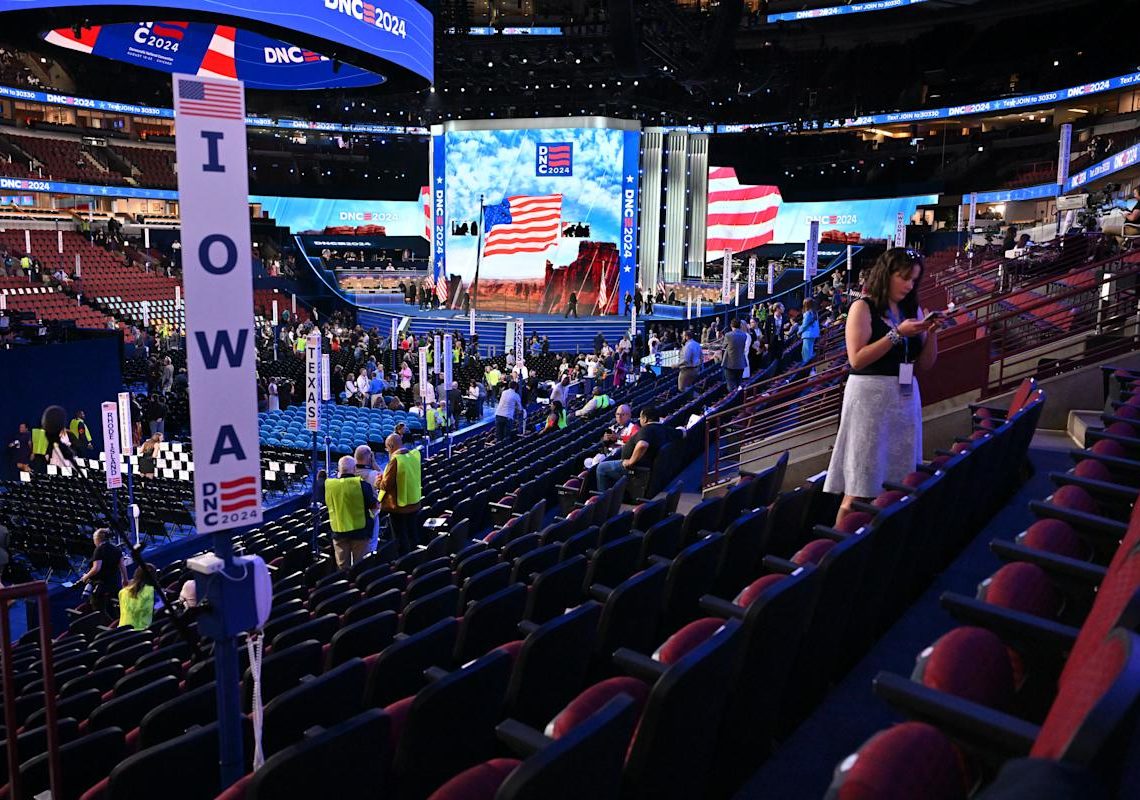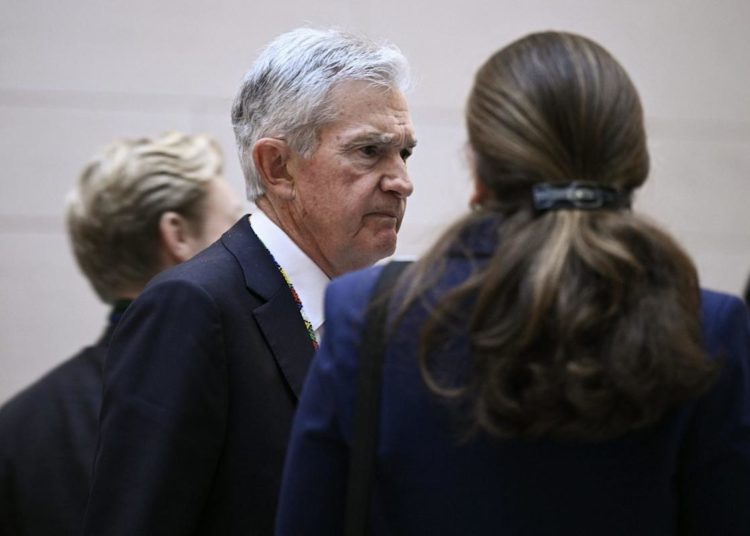For Iowa Democrats, it has been a difficult several years.
The Republicans took full control of the state’s congressional delegation after the 2022 election. The following year, the national Democratic Party stripped the state of its first-in-the-nation status in the presidential nominating process. And in November, Donald Trump carried Iowa by 13 percentage points, his largest margin of victory there in three elections.
But with two marquee statewide races – and a state economy that is especially rattled by Trump’s trade war – Iowa Democrats say they are sensing an opportunity to claw back into competition with the Republicans.
Democrats are looking to seriously contest the newly open governor’s race, the U.S. Senate contest and most of the state’s U.S. House races next year, though the odds are squarely against them. The nonpartisan Cook Political Report rates the two statewide contests as “Solid Republican,” and Democrats last flipped a House seat in Iowa in 2018.
The governor’s race could be especially enticing, Democrats say. The unexpected decision by Republican Gov. Kim Reynolds this month to not seek reelection paved the way for the first open gubernatorial race in the state since 2006, and Democrats immediately turned to their only remaining statewide elected official, Auditor Rob Sand, as a potential candidate.
“There are a lot of people who are seeing this as an opportunity,” Iowa Democratic Party Chairwoman Rita Hart said. “I think we’re going to have more experience. We’re going to have people that have more name recognition. And I think that they’re going to be announcing earlier than before.” Hart predicted the issue of Trump’s tariffs “definitely is going to be the focus of many campaigns.”
The party that controls the White House usually performs poorly in its first midterms, leaving many Republicans bracing for political headwinds in 2026. And in Iowa – the second-biggest agricultural exporting state in the country – not all Republicans have been fully on board with Trump’s sweeping – and ever-changing – tariffs, which, at a minimum, have created deep uncertainty for farmers who make a living selling their crops to other countries.
But they scoff at the idea that the political environment will lead to any reversal of the state’s reddening.
Brad Sherman, a pastor and former state representative who has been running for governor as a Republican, predicted the state would continue trending Republican and expressed little concern about political backlash from Trump’s tariffs.
“We all knew that the tariffs would have some ups and downs to it,” Sherman said. “I’m not too worried about it at this point. There’s lot of other issues in Iowa that will affect the economy.”
Iowa is the kind of place many Democratic operatives believe they need to be more competitive in: It is a state that Barack Obama won twice in presidential contests and is home to the rural, working-class voters who have been drifting toward Trump. When it comes to Senate races next year, national Democrats have few obvious pickup opportunities after Maine and North Carolina, leaving them looking for other, less likely opportunities to flip seats.
“If we want to take control of the Senate ever again, we need a plan to recruit and support candidates who can win in states like Texas, Iowa, and Ohio, and by definition those people may have some disagreements with people who went to grad school and live in a major urban metro,” Pat Dennis, president of the top Democratic research group American Bridge 21st Century, wrote last month on X.
That’s where people like Nathan Sage may come in. He became the first Democrat to declare against GOP Sen. Joni Ernst, making his announcement last week with a high-energy, profanity-peppered video that emphasized his background as a veteran, mechanic and radio announcer who grew up in a trailer park.
In an interview, he pitched himself as a “different Democrat” who can appeal to working-class Iowans who have grown weary of partisanship amid day-to-day concerns about making ends meet.
When it comes to tariffs, Sage argued in a statement that America has “gotten the short end of the stick in past trade deals but you don’t have to be an economist to see that Trump’s tariff chaos is a disaster.”
Like most Trump-allied Republicans, Ernst has urged patience on the tariffs, suggesting that the president is using them to address the U.S. trade deficit. She told Fox Business this month that people “need to give the president some space and time to do his negotiation.”
While the Senate race is likely to draw more and better-known Democrats, Sage’s opening pitch aligns with the kind of message the party hopes to have for 2026. Hart said one of the major lessons the party took from the 2024 election is that the economy is “No. 1 for folks” and that Democrats should have talked about it more.
The governor’s race, however, could end up as the main attraction. With Sand, who many Democrats hope will run, the party would have a well-funded contender – he had $7.5 million in his campaign account at the end of 2024 – who has been able to cut a less partisan image as the state’s top financial watchdog, speaking out about government waste, fraud and abuse.
Sand wished Reynolds well after she announced her retirement, but he has not publicly commented on whether he will run to replace her, and his political team declined to comment.
“It’s definitely a race we’re keeping our eye on,” said Sam Newton, a spokesperson for the Democratic Governors Association. “We believe that there’s a real opportunity for a competitive race with a strong candidate who fits the state well.”
Republicans dismissed the Democratic notes of confidence.
“For years, the Iowa Democratic Party has been losing ground – legislative seats, voter registrations – you name it,” Iowa GOP Chairman Jeff Kaufmann said in a statement, alluding to statistics that show there are over a third more registered Republicans in the state than Democrats.
For Republicans, the race could be a chance to test Iowa’s loyalty to Trump. Reynolds has been generally supportive of Trump, but she crossed him in the 2024 GOP presidential primary by endorsing Florida Gov. Ron DeSantis. The first statewide elected official to endorse Trump during that race, Attorney General Brenna Bird, is among the prominent Iowa Republicans weighing a run to succeed Reynolds.
Democrats are also seeing increased opportunity in the state’s U.S. House races. The Democratic Congressional Campaign Committee announced this month that it would target three of the state’s four GOP-held House districts.
Trump has acknowledged that farmers are “always put on the Front Line” in a trade war with countries such as China. But he has urged them to be patient, pointing to the trade deal he struck with China in his first term to argue that the wait will be worth it.
Trump and other administration officials have spent recent days hinting at negotiations with China and voicing optimism, though the Chinese government has been less sanguine.
Iowa’s senior U.S. senator, Republican Chuck Grassley, is a longtime skeptic of tariffs and recently co-sponsored a bill to rein in the president’s tariffs power that Trump threatened to veto. But in other corners of the Iowa GOP, Republicans are willing to give Trump more leeway – for now.
Kaufmann argued that Trump is “working to clean up” the economy that predecessor Joe Biden left him and that farmers are “fed up” and “respect a leader who’s not afraid to take on China.”
Related Content
You can read with a cat on your lap at this bookstore, then adopt the cat
What does it take to beat an evil empire? ‘Andor’ knows.
The Abrego García case: A timeline and assessment of key documents
The post Trump tariffs have Democrats seeing an outside chance in this red state appeared first on Washington Post.



